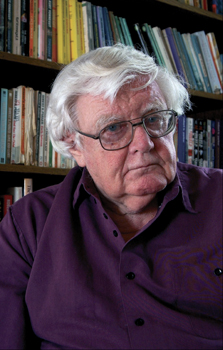Albert Hunt
Director of Theatre and Complementary Studies
at the Regional College of Art, who later held the
fabulous title of Happenings Officer for Bradford & Ilkley Community College, Albert Hunt, was
employed between 1965 and 1985. Albert is the
author of Hopes for Great Happenings among
other titles.
 “I came to head up Complimentary Studies on the proposed
Diploma in Art & Design course in May 1965. But we failed
to get the course and so frustrated, I found another job.
After lunch one day, I dreamt up a scheme and I wrote a
proposal setting out what I would have liked to have done
if I had stayed. I took this fantastic programme to the
Principal as a parting gesture and I was amazed when he
said ‘I don’t see why you shouldn’t do this.’ Because of
failure to get the course, I was completely free and for a few
years I did exactly what I wanted. They were good times.
“I came to head up Complimentary Studies on the proposed
Diploma in Art & Design course in May 1965. But we failed
to get the course and so frustrated, I found another job.
After lunch one day, I dreamt up a scheme and I wrote a
proposal setting out what I would have liked to have done
if I had stayed. I took this fantastic programme to the
Principal as a parting gesture and I was amazed when he
said ‘I don’t see why you shouldn’t do this.’ Because of
failure to get the course, I was completely free and for a few
years I did exactly what I wanted. They were good times.
Students were meant to spend 10% of their time on
Complimentary Studies but instead of attending weekly
classes we ran projects lasting a fortnight. This did not just
apply to Arts students but all students in College.”
Over the years, Albert was responsible for some incredible ‘happenings.’ For instance, in 1967, 300 students
commemorated the 50th anniversary of the Russian
revolution by re-enacting it on the streets of Bradford and
various public buildings, designated areas held by the
provisional government, were stormed by Bolsheviks.
“Another important project was The Survivors. I appealed
in the local paper for anyone who had lived through WWI
to come forward. We recorded their experiences and later
held an evening in a pub on Armistice night. People spoke
of the generation gap but long after closing time our young
students were talking to veterans.”
In 1968 this work led to Albert’s founding of The Bradford
Art College Theatre Group, which performed original and
provocative material to great acclaim at national and
international festivals. Vast amounts of research went
into devising these pieces. “For Looking Forward to 1942 (1970) we recorded the sincere beliefs of a number of
small fundamentalist sects and a spiritualist medium and
held a series of theatre workshops where we combined
the material gathered with history. The final show told the
history of WWII in the form of a Pentecostal meeting with
songs and opposing sides giving their testimonies.”
Other plays included: John Ford’s Cuban Missile Crisis (1971); James Harold Wilson Sinks the Bismark (1972);
The Fears and Miseries of Nixon’s Reich (1974) and The
Passion of Adolph Hitler (1975). Albert then spent 7 years
on sabbatical in Australia.
“I had written a book about Peter Brook and his phrase ‘necessary theatre’ stayed in my mind. We had done
my play, A Carnival for St Valentine’s Eve, about the
destruction of Dresden in London and Oxford before I went
to Australia. When I returned we took the show to Dresden,
then behind the Iron Curtain. One after another, young
communists in the audience denounced us until an old
woman spoke of her experiences the night Dresden was
bombed. Soon others joined in and there was an outpouring
of repressed memories. People later told us that their
children had seen the play and started asking questions. I
couldn’t think of any theatre more necessary than this.
There is now a distorted perception of the 1960s. I
passionately think the work we did, with people inside
and outside College, was hugely important. It was not
eccentricity but about engaging with people and valuing
their experiences. Having people cooped up in classrooms all
day, tested and harangued by authority, as they are today,
is true eccentricity.”
Photograph by Andy Vaines